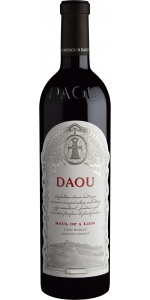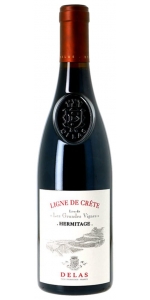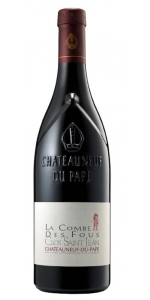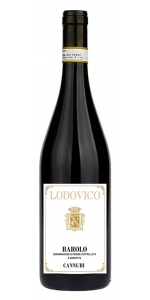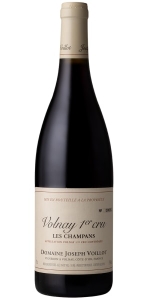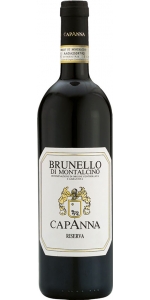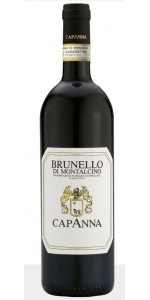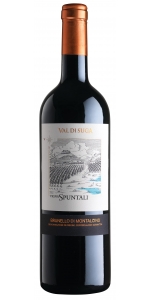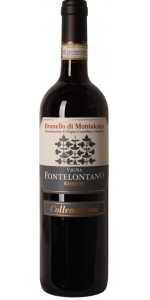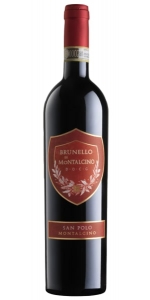Capanna Brunello di Montalcino Riserva 2016
3 bottles with free shipping for: $450.00
6 bottles with free shipping for: $870.00
12 bottles with free shipping for: $1,668.00
| BUY MORE! SAVE MORE! | ||||||||||||||||||||
|
| Country: | Italy |
| Region: | Tuscany |
| Winery: | Capanna |
| Grape Type: | Sangiovese |
| Organic: | Yes |
| Vintage: | 2016 |
| Bottle Size: | 750 ml |
Capanna Brunello di Montalcino Riserva 2015
TYPE: DOCG
BLEND: 100% Sangiovese carefully selected in the oldest vineyards and only of the best harvests.
VINIFICATION:
Alcoholic fermentation with maceration of the skins (30-35 days) at a controlled temperature and spontaneous malolactic fermentation, both in truncated cone-shaped Slavonian oak vats.
AGEING:
In Slavonian oak casks of 10 to 25 hl for over 40 months; followed by ageing in bottles for at least 15 months.
NOTES:
Colour: deep ruby red, strong, lively.
Bouquet: very intense and complex, fruity and spicy, with red fruit, jam and liquorice shades; great prospects of future development.
Taste: great structure in the acid-tannin components, well supported by the soft ones; extremely persistent.
Food pairings: roast red meats, game and very aged cheeses.
Review:
Powerful, sparkling garnet red. Rich, very appealing nose with notes of ripe raspberries and fresh plums, some liquorice and fine spice notes in the background. Grippy, fine-meshed tannin on the palate, builds up in many layers, salty, good tension, very long finish in the finish.
- Falstaff 98 Points
The Capanna farm, owned by the Cencioni family since 1957, is situated in the Montosoli area, to the north of Montalcino. It was founded by Giuseppe Cencioni and, helped by his sons Benito and Franco, it was one of the first farms of the modern period of Brunello. They started bottling their own wines in the 1960's and after Brunello di Montalcino was granted DOC status in 1966, Giuseppe was one of the 25 founders of the Consorzio del Vino Brunello di Montalcino. Production, initially only a few thousand bottles, then increased when new vineyards were planted. In 1975 they began exporting Brunello di Montalcino DOC – Capanna 1970 – to Germany and then new markets were reached in subsequent years: United States of America, Canada, Switzerland, Belgium, Holland, Japan, Austria, Poland, Denmark and others (about 20 overall). The Capanna farm is still family run from both a farming and winemaking viewpoint, furthermore, it is Amedeo Cencioni himself, Patrizio's son and representative of the fourth generation, who supervises the oenological and agronomic parts of the cellar.
DAOU Vineyards Soul of a Lion is made from 78% Cabernet Sauvignon, 12% Cabernet Franc, 10% Petit Verdot.
The 2019 Soul of a Lion is a blockbuster vintage that showcases how Bordeaux varieties are remarkably suited to the terroir of DAOU Mountain. This wine explodes from the glass with a kaleidoscope of aromas and flavors, including blackberry, blueberry, black currant, dark cherry, sweet tobacco, and licorice. An added floral dimension imparts an integrated sense of elegance and freshness. While full-bodied with ultra-high phenolic levels, this wine maintains its evenness and poise through an extraordinarily long finish. Structured, balanced, and powerful, the 2019 Soul of a Lion will reveal its full magnitude after several years of careful cellaring.
Review:
The 2019 Soul Of A Lion is a blend of free-run Cabernet Sauvignon, Cabernet Franc, and Petit Verdot, aged 22 months in 100% new French oak. Opaque ruby in color, it offers aromatic contrast between dark, savory cherry fruit, chargrill and graphite, and top notes of green pepper and rose petals. The palate explodes with detailed flavors and its tannins are already resolved and chocolaty, with seamless acidity and exotic spicy layers emerging on the extended finish. Wow!
-Wine Advocate 97+
Delas Hermitage Les Grandes Vignes Ligne de Crete is made from Syrah.
The nose discloses aromas of spice and leather intertwined with deep berry aromas (blackberry, redcurrant) and heady floral notes, liquorice and incense. Its richness, complexity and elegance are by no means a contradiction. The finest granite soils of the Hermitage hillside are to thank for this wine's incredible minerality and finesse. The wine is rich and dense on entry to the palate, where it shows an elegant, broad and flavorsome character. The ripe, smooth and well-integrated tannins contribute to the wine's powerful yet harmonious structure. The palate reveals the same aromas as those found on the nose with nuances of blueberry, raspberry, violet and bitter chocolate. Ligne de Crête is characterized by its exceptional structure, harmony and balance.
This remarkably smooth and elegant wine makes the perfect partner for a pigeon pie, beef tartare ravioli or a roast fillet of deviled duckling with cranberries. It also makes an excellent choice for woodcock, hare "à la Royale" or even a roast rack of lamb in a herb crust.
Review:
Whiffs of espresso, ore and charred meat mingle into thunderous flavors of crème de cassis and roasted plums in this wine. A single-site expression of Les Grandes Vignes from a ripe yet fresh vintage, it's a showstopping Syrah marked with a creamy texture and ripe tannins. Hermitage is not known for youthful pleasures but this rare bottling embraces the hedonism of adolescence along with its potential to gain power and complexity far beyond 2050. Anna Lee C. Iijima
-Wine Enthusiast 97 Points
Inky ruby color. Expansive, smoke- and mineral-accented black and blue fruits, licorice, smoky bacon, mocha, violet and licorice on the highly perfumed nose. Appealingly sweet, mineral-accented cassis, boysenberry, fruitcake, floral pastille and vanilla flavors show superb depth and become spicier with aeration. Shows superb detail and mineral lift on the youthfully tannic, extremely persistent and incisive finish, which features resonating floral and exotic spice notes.
-Vinous 97 Points
Clos Saint-Jean is a 41-hectare estate in Châteauneuf-du-Pape run by brothers Vincent and Pascal Maurel. Considered by many critics and wine-writers as the preeminent estate espousing the modern style of winemaking in Châteauneuf, this cellar is one of the oldest in the region, having been founded in 1900 by the greatgreat-grandfather of Vincent and Pascal, Edmund Tacussel. A short time after its founding and well before the AOP of Chateauneuf-du-Pape was created in 1923, Edmund began bottling estate wines in 1910.
The farming at Clos Saint-Jean is fully sustainable due to the warm and dry climate, which prevents the need for chemical inputs. Instead, Vincent and Pascal employ organic methods for pest control, mainly pheromones, to prevent pests from taking up residence in their vines, a process called amusingly enough in French, confusion sexuelle. The vines tended manually, and harvest is conducted in several passes entirely by hand.
Combe des Fous literally means, the hill of the fool. The hill, in this case, is located in the far southern reach of Le Crau which was left barren for many centuries because the layer of galets was so exceedingly deep that everyone assumed vines could never survive there. The fool in this situation is Edmund Tacussel, the great-great-grandfather of Vincent and Pascal Maruel who planted a Grenache vineyard on this site in 1905. That old-vine Grenache form the heart of this cuvée with a small amount of Syrah, Cinsault and Vaccarèse. La Combe des Fous is only made in the best vintages.
Review:
Pumps out heady raspberry, mulberry and blackberry compote notes that keep form and direction, thanks to a roasted apple wood spine and flanking ganache, garrigue and warm earth notes. Seriously grippy finish. Grenache, Syrah, Cinsault and Vaccarèse.
-Wine Spectator 96 Points
The 2020 Châteauneuf Du Pape La Combe Des Fous is a normal blend of 70% Grenache, 20% Syrah, and the rest Vaccarèse and Cinsault. Beautiful, full-bodied aromas and flavors of ripe black raspberries, violets, ground pepper, lavender, and herbes de Provence all emerge from this gorgeous barrel sample, and it shows the pure, fresh, yet still concentrated style of the vintage brilliantly.
-Jeb Dunnuck 94-97 Points
Lodovico Barolo Cannubi is made from 100% Nebbiolo.
With a ruby-red color, the Barolo Cannubi has a rich bouquet which gradually recalls the scents of roses flowers, truffles and wood spice. The palate is at first elegant and refined, then is begins to gain in complexity with a little breathing or decanting.
Vine: Nebbiolo, sub-variety Lampia and Michet
Grapes provenance: Cannubi Boschis vineyard in the village of Barolo
Soil: composed mainly of large clayey limestone marls and sands
Vineyards: South-est facing with Guyot pruning (6-8 buds / vine)
N° Vines / hectare: 5000
Yield / hectare: 50-55 q / Ha
Plant year: 1970
Size of the vineyard: 1.3 hectare (3.21 acres) in the family since 1996 out of 40 hectares (98.8 acres) total for Cannubi.
Average height: 250-260 mt
Nebbiolo is a native black grape variety of Piedmont that gives birth also Barolo and Barbaresco. The name ‘Nebbiolo’ derives from the word ‘fog’ and there could be two reasons. The first hypothesis traces the name of Nebbiolo back to the obscured, almost clouded appearance of the grape, covered with abundant bloom. The second hypothesis, more suggestive, is linked to the very late ripening of the grapes: the Nebbiolo grape harvest often takes place in late October, when the vineyards are enveloped in morning mists.
Pairs with aged cheeses, red meat, rich/earthy dishes, truffle risotto, pasta with sausages and mushrooms. Braised or roasted meats.
The 2021 Domaine Joseph Voillot Volnay Les Champans Premier Cru is from the domain’s largest premier cru holding, 4.2 acres whose vines date from 1934, 1971, and 1985. Champans is down-slope in the premier cru band, and its wine typically has more fruit and power than other Voillot Volnays.
Review:
‘The 2021 Volnay Les Champans Ter Cru has much more brightness and delineation than the Fremiets this year, with red cherries, wild strawberries and ust a touch of iodine and sous-bois. This is nicely focused. The palate is medium-bodied with sappy red fruit, fine structure, pliant tannins and a harmonious finish. Not the most complex Champans encountered from this address, yet it has class.
-Vinous 91-93 Points
The 2021 les Champans is also a simply stunning example of this fine premier cru vineyard. The beautifully elegant nose wafts from the glass in a blend of red and black plums, cherries, spit-roasted quail, a complex base of soil, woodsmoke, coffee bean and a deft touch of vanillin oak. On the palate the wine is pure, full-bodied and shows off superb depth at the core, great soil signature, ripe, fine-grained tannins and a long, nascently complex and very promising finish. This is a touch more reserved on the palate than the Fremiets and will take a bit longer to blossom, but it is going to be stellar. 2034-2085.
93+ pts- John Gilman, View from the Cellar #102
Bertrand Bachelet Chassagne Montrachet Premier Cru Morgeot is made from 100 percent Chardonnay.
The Chassagne-Montrachet appellation is located in the southern part of the Côte de Beaune and produces mainly white wines.
'Morgeot' is located in the south of the village, characterized by compact limestone soil containing iron oxide, which gives the soil its particular red-brown color.
The wine offers a golden color, a subtle nose of white flowers and honey notes. Full-bodied and well-structured on the palate.
The softness of the Chardonnay on the palate makes an interesting pairing with cooked foie gras; it also sits well with lobster, spiny lobster, or even morel mushroom dumplings or Bresse chicken in a cream sauce.
Capanna Brunello di Montalcino Riserva is made from 100 percent Sangiovese.
TYPE: DOCG
BLEND: 100% Sangiovese carefully selected in the oldest vineyards and only of the best harvests.
VINIFICATION:
Alcoholic fermentation with maceration of the skins (30-35 days) at a controlled temperature and spontaneous malolactic fermentation, both in truncated cone-shaped Slavonian oak vats.
AGEING:
In Slavonian oak casks of 10 to 25 hl for over 40 months; followed by ageing in bottles for at least 15 months.
NOTES:
Colour: deep ruby red, strong, lively.
Bouquet: very intense and complex, fruity and spicy, with red fruit, jam and liquorice shades; great prospects of future development.
Taste: great structure in the acid-tannin components, well supported by the soft ones; extremely persistent.
Food pairings: roast red meats, game and very aged cheeses.
Review:
Bright ruby in the glass. First impact is low key, with red cherry, leather, tobacco, fresh violet and balsamic notes. The attack is velvety, with a full body, lifted acidity and dense, ripe tannins. Character emerges from the glass, meaty and bloody. Thick, dry finish that’s fierce. Drink or hold
-James Suckling 95 Points
TYPE: DOCG
GRAPE VARIETY: 100% Sangiovese harvested from the oldest vineyards.
VINIFICATION: Alcoholic fermentation with maceration of the skins (25-30 days) at a controlled temperature and spontaneous malolactic fermentation, both in truncated cone-shaped Slavonian oak vats.
REFINEMENT: In Slavonian oak barrels from 10 to 32 hl for approx. 34-38 months; followed by bottle refinement of at least 6 months.
ON SALE BY:January of the 5th year after the harvest.
NOTE:
Color: intense ruby with garnet reflections.
Perfume: ethereal, of red fruit and vanilla, persistent.
Taste: harmonious, with excellent tannins and structure, very persistent.
Food pairings: roasted red meats, game, mature cheeses.
Review:
A jeweled ruby color, the 2019 Brunello Di Montalcino is forward with licorice spice on the nose and opens to notes of fresh black cherries, pine, and toasted rosemary. Medium to full-bodied, it offers wonderful energy from the start, with balanced, angular structure, ripe tannins, crunchy fresh acidity, and a long finish. Avery well styled Brunello, it will be in its prime in the coming 10-15 years.
-Jeb Dunnuck 95 Points
Aromas of redcurrants and red flowers, followed by a touch of pie crust and sandalwood. Full-bodied with steely and sturdy tannins and vivid acidity. Dried-herb character at the end. Masculine and structured. Hold until 2027.
-James Suckling 95 Points
This is a 6 pack with 2 bottles each from vintages from 2013, 2015, and 2016.
***Tenimenti Angelini Val di Suga Vigna Spuntali Brunello di Montalcino 2016:
The 2016 Vigna Spuntali Brunello di Montalcino is the most brooding of the lineup from Val di Suga and is sourced from the southwest of the region on sandy soils. There are aromatics of black raspberry, licorice, menthol, sage, cinnamon, and iron-rich earth. Its Mediterranean influence is felt on the palate with ripe black cherry, dried herbs, and sun-baked earth. This is the fullest bodied and most savory of the Val di Suga lineup, with more roundness and grip. Its structure will benefit from cellaring for several years and will be great drinking over the next 20 years or more. 2026-2040.
-Jeb Dunnuck 96 Points
***Tenimenti Angelini Val di Suga Vigna Spuntali Brunello di Montalcino 2015:
The 2015 Vigna Spuntali Brunello di Montalcino is more introverted on first opening, with notes of black plum, licorice, dried Mediterranean herb, and sun-baked earth. On the palate, it offers a tart dried fruit character, with a building tannin structure that finishes with tomato leaf, and bitter herbs. The most rustic and burly of the wines in the lineup of the 2015 Val di Suga vintage, it will benefit from allowing some time in cellar to see how this matures and its tarriness develops. Drink 2026-2036
-Jeb Dunnuck 94 Points
***Tenimenti Angelini Val di Suga Vigna Spuntali Brunello di Montalcino 2013:
Plenty of spices and fresh herbs on the nose, such as dried rosemary and nutmeg, to match the underlying dried redcurrants and cranberries. Full-bodied with plenty of concentration, but still shows a very sturdy, tannin backbone and punchy acidity, to drive this through to a long finish. Drink in 2021.
-James Suckling 94 Points
Collemattoni Brunello di Montalcino Riserva is made from 100 percent Sangiovese.
Intense ruby red with brilliant burgundy reflects in color. Reminiscent of wild black fruits, vanilla and spices on the nose and dry, warm, slightly austere but velvety in the palate.
This wine comes from the oldest vineyard of Collemattoni: Fontelontano. Less than half hectare. It's one of the few Single Vineyard Brunello di Montalcino riserva.
Coming from a parcel with 15-18 year old vines planted in sandy clay and marl soils.
Harvest is 100% destemmed with a soft pressing, fermentation in stainless steel tanks at controlled temperature of 28-30°C, pumping over for the first week of maceration following by skin-contact maceration for 20-25 days with rack and return technique (delestage).
Malolactic fermentation completed. The delestage and the pumping over are then spaced out along the process.
Wine is slightly filtered before bottling.
Review:
This is intense with aromas of dried cherries, sweet licorice, cloves, crushed walnuts and hints of chocolate and undergrowth. Full-bodied, deep and structured with taut, tightly packed tannins. Long and persistent. Drink or hold.
-James Suckling 94 Points
Poggio San Polo Podernovi Brunello di Montalcino is made from Sangiovese.
Intense ruby red in color with garnet hues, clear and glossy. The bouquet exhibits typical aromas of violets and small red berries. Subtle nuances of forest undergrowth, aromatic wood, a touch of vanilla and jammy mixed fruit then give way to subtle hints of coffee. This Brunello is intense, persistent, broad and heady. Full-bodied and warm on the palate, with a densely-woven texture and robust body, it has a persistent finish with well-rounded tannins. The particular features of the terroir at San Polo produce a Brunello with a capacity for lengthy aging, while patient cellaring enhances the wine during ageing in the bottle.
Review:
Lovely purity of fruit with ultra fine tannins and depth, finesse and complexity. Black cherries, cedar and some flowers. It’s full-bodied with very fine tannins that drive the finish. Give it a year or two to open more, but already so enticing. Drink or hold.
-James Suckling 96 Points
The San Polo 2015 Brunello di Montalcino Riserva (with 8,000 bottles produced) is a textured wine with hearty fruit and touches of smoked meat and spice. At its core, the wine offers dark fruit, blackberry and ripe plum. The rich fruitiness of the wine cedes to campfire ash, mahogany and furniture wax. These results are sultry and even a bit flashy, with distant background tones of teriyaki and plum sauce. The wine is fermented in cylindrical oak fermenters and aged in oak for three years. We'll see this bottle hitting the market sometime after February 2021.
-Wine Advocate 95 Points
Deep ruby red, strong, lively. The bouquet is very intense and complex, fruity and spicy, with red fruit, jam and licorice shades; great prospects of future development. This wine has great structure in the acid-tannin components, well supported by the soft ones; extremely persistent.
Review:
Rich and dense, with cherry, raspberry, black currant, violet, mineral and spice flavors. Shows a spine of acidity that provides definition and keeps this red vibrant from beginning to end. Balanced, long and shows excellent potential. Best from 2025 through 2042. 250 cases made, 100 cases imported.
-Wine Spectator 96 Points
- back
Hall Wines The Kathryn Hall Cabernet Sauvignon is made from 96% Cabernet, 4% Merlot.
The 2017 Kathryn Hall is deep, dark ruby in color and elegantly balanced with layered aromas of concentrated blackberry, freshly turned earth, and a hint of warm, spicy oak. The palate is fruit-forward with underlying notes of rich cocoa and leather. Layers of black fruit, nutmeg, cassis and brooding earthy notes are abundant. Supple, seamless tannin abounds, and the wine finishes with an incredible dark fruit feed-back that lasts several minutes.
Review:
The 2019 Cabernet Sauvignon Kathryn Hall is a blend of 95% Cabernet Sauvignon and 5% Merlot, brought up mostly in new barrels. It’s a killer bottle of wine offering lots of ripe black fruits intermixed with savory herbs, melted chocolate, and tobacco. Medium to full-bodied on the palate, it shows the lush, round, velvety style of the 2019 vintage and is already impossible to resist. It’s going to evolve for 15+ years if well stored.
-Jeb Dunnuck 95 Points
Niner Cabernet Sauvignon is made from 91% Cabernet Sauvignon, 3% Cabernet Franc, 3% Petit Verdot, 3% Malbec.
2021 was a benchmark vintage for Cabernet in Paso Robles. The long, cool growing season was ideal for our Bordeaux grapes and allowed them to slowly ripen, creating complex flavors and wines built to age. The 2021 Cabernet Sauvignon was aged 21 months in French Oak barrels and is one that you’ll want for your collection. It is an elegant wine with a balance of dark fruit flavors and herbaceous notes with lush tannins.
Review:
92 points, Editor's Choice - Wine Enthusiast


